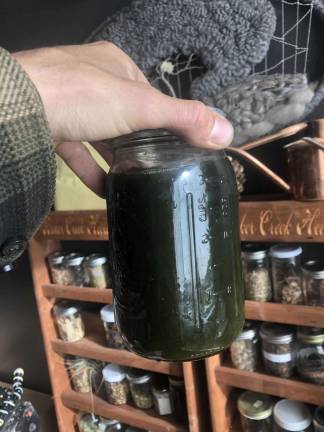What’s a tincture anyway?

Winter is the time that we take inventory of all that we have harvested and grown throughout the year, what we can make from what we have, and what seeds we need to acquire.
Tinctures are one of the best ways to not only preserve herbs, but also to concentrate dosage for our healing needs.
A tincture is a potentized plant extract, which is very shelf stable. It’s generally an alcohol-based preparation, but the liquid medium can also be vinegar, or a mix of both. Tea is less concentrated and doesn’t last as long as a tincture, so you can use both a tea and tincture in combination for healing.
I recommend using organic vodka for anything that is known as a “flowering top”: flowers, leaves, stems and/or seeds. Because alcohol carries herbal constituents into the blood stream, it can be a fast acting remedy. All you need is a ball jar and the herbs.
In alcohol, you can use either fresh or dry plant matter. Fresh herbs tend to be stronger.
Chop the herb into fine pieces, fill the jar half to two-thirds full of plant matter, pour the alcohol over, then wait one moon cycle (about a month). From there you can strain out the plant matter. Now you have a simple tincture, concentrated and easily absorbed into your system, to help you throughout the winter months when cold and flu is likely.
You can research the plant’s healing properties you will be making a tincture from so that you can get familiar with its application. The more you work with plants, the more you will learn.
Some common tinctures you can start with that help strengthen the are generally tonic are chickweed, nettle, and dandelion leaf or root. These herbs are high in minerals and help with rebuilding the body. Chickweed grows over the winter months, so you may be able to go out and find some now.
Depending on what plant or mushroom your tincture is made from, you can either take it throughout the day if it has beneficial immune properties, or very selectively if you are working with an acute condition.
Remember, with any herb, you should always start with a small dose and work yourself up to the effect you’re seeking over several days or weeks, depending on the herb.
Dan De Lion